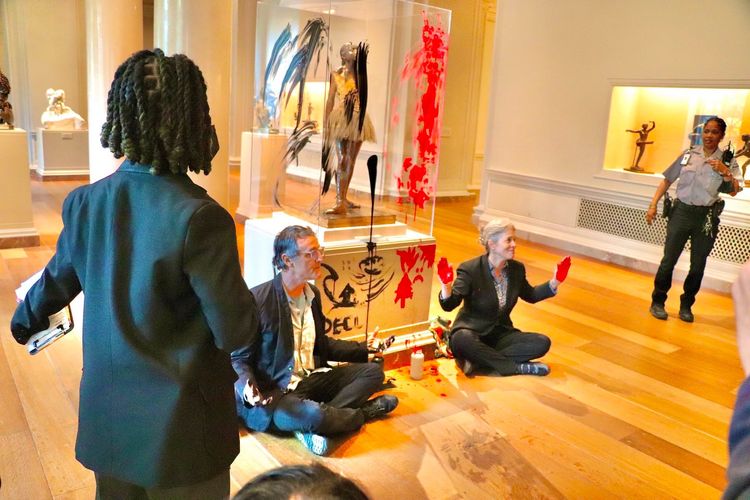The Price of Oppression
The Price of Oppression: Q&A with Tamara Toles O’Laughlin
By Mary Annaïse Heglar
With all the hemming and hawing about the Manchin Climate Bill this week, you may have noticed that the biggest proponents of the bill are…white people and white-led organizations that are far removed from the frontlines of the climate crisis. Black and brown voices were either missing or expressing deep distrust of the bill and its authors. Now, I’m no policy wonk, but I’m friends with a couple of them. When I want to understand a policy from an environmental justice perspective (which is pretty much always), one of the people I turn to first is my dear friend Tamara Toles O’Laughlin.
Tamara has been in the climate game for a minute. She was once the North America director for 350 and is currently the president and CEO of the Environmental Grantmakers Association. She’s also the founder of Climate Critical Earth, which seeks to center Black women in the pursuit of climate justice. (Full disclosure: I am one of the advisors for that project.) When it came to the IRA, I had a few questions, and Tamara, as always, had thoughtful answers.
What was your first thought when you heard that the Democrats had struck a deal on climate change?
My first thought was that we should brace ourselves for the Coal Man’s best shot at climate x industry consensus. I immediately felt concern that the alignment within the climate and environmental community was about to be tested.
Let's start with the positives: what about the bill are you excited about and why?
I’m not excited about the bill. I am conflicted by the opportunity and explicit oppression within it. I would be thrilled for action at the federal level that can catalyze global repositioning on the end of coal, oil and gas. However, there is only a sliver of that on offer here to include the necessary extension of proven tools such as the Investment Tax Credit and the Production Credit, micro grids, solar and wind, rural electric cooperatives with direct pay financing.
What are the parts of the bill that give you pause?
A lot. The Inflation Reduction Act offers millions when billions are required for forests, land management, transportation infrastructure, and some small number of dependent and hard fought dollars to the rural poor, the scarcely housed and racialized (BIPOC) communities. I’m all for electric vehicles, lightbulbs, batteries and storage but deployed in the actual context we live in—not one where folks pretend the stakes, harm or advantage to fossil fuels isn’t imbalanced.
The IRA (a triggering acronym) laces the planetary pathway toward sustainable energy with unproven, disproven, and dirty energy production (enhanced oil recovery, biomass, hydro by many colors, and carbon dioxide removal speculation) and locks in subsidies that normalize technological loopholes that increase investments in the companies that fuel the climate crisis at the cost of disinvestment in the communities that are already in harm’s way.
The IRA unfairly reopens closed processes, pipelines, pathways and projects that Black, Indigenous and people of color, rural poor in community have have soundly rejected through due process. The “side deal” reengagement on Mountain Valley Pipeline is the beginning of a bad bargain.
The IRA levels the playing field for incumbent and entrenched technology with no promise of lowering emissions unless the very same communities that are facing the externalities, harm and financial, technocratic disinvestment are magically resilient enough to keep those technologies in check and advocate relentlessly to avoid death. The bill inserts a small number of hydro, carbon capture and sequestration notions into the mix despite the long articulated rejection of those technologies by communities that are stewarding, protecting and fighting for fossil fuel nonproliferation, demilitarization, and climate reparations for past and present devastation.
And for my people who are Black, the IRA Offers up vague, process heavy and short term financial support to environmental Justice, climate Justice and all other communities made vulnerable by racist zoning, and exclusion by leveraging Block grant, and provides momentum to trade away frontline legal protections such as the National Environmental Policy Act.
The IRA bolsters further degradation and demands that all of us— we the people—pay for it in the form of subsidies, and lowers the price of oppression by handing over public dollars to polluters.
This bill doesn't go far enough to protect frontline communities or to cut emissions in line with even the most conservative climate models. What needs to be done next to get us closer to those two goals?
We need real money on the table, a schedule for non proliferation, demilitarization and for polluters to be stripped of the golden parachute of more coal, oil and gas access and subsidies to be fast tracked rather than time tested regulation. Poor, vulnerable and racialized (BIPOC) communities need our allies to stand with us now to demand better because that’s what we have all been training for in all those JEDI, DEI and equity trainings. We need investments that cut inflation but not by going through the heart of community.
Oil Colonialism Never Ended
By Amy Westervelt
On this week’s podcast episode we covered the latest happenings with climate policy and the Inflation Reduction Act of course, but we also covered an important and often-missing component of that conversation: how American companies are expanding fossil fuel development all over the world. In a high stakes game of musical chairs, the world’s top oil companies are trying to tap every reserve they have while they can, lest they be the fool left with the most worthless barrels of oil. It has nothing to do with supply or demand, just greed and profits, but while the companies doing the drilling are American or European, the media coverage of these plans often focuses on the leaders of less developed countries and how foolish or corrupt they are, as though they are the ones with all the cards, not just playing the terrible hand they’ve been dealt.
Cultural Climate
By Amy Westervelt
We’re noticing more and more climate storylines on TV shows and in movies lately—and we like it! From the climate story in the second season of Tuca & Bertie to For All Mankind’s alternate future, in which we solved for climate change in an effort to beat the Russians to Mars, the story of our time is finally making its way into…the stories of our time. We’re planning a podcast episode soon where we’ll look at some of our favorite examples, not just in new shows but also some classics. (Beasts of the Southern Wild anyone?)
We want to hear about your favorites, too! If you’ve seen an interesting climate storyline, climate-focused show, or even a surprise climate aside in your favorite sitcom, let us know! It can be a movie, documentary, stand up special. We’re casting a wide net! You can email us here, or DM or tweet at us @RealHotTake on Twitter.
And make sure to check out the episode on 8/19! We’ll be sure to recap the recommendations here too so you’ve got a handy reference.
Digest
Your weekly roundup of climate coverage, compiled by the great Jules Bradley and Georgia Wright of Inherited.
Rising Temperatures, Rising Tides
Wildfires Have Burned Through California's 100-Year Carbon Insurance in 10 Years, Study Finds, by Aaron Gordon for Vice
Updated Hurricane Forecast Still Predicts ‘Above Normal’ Season - The New York Times, by Elena Shao
At Least 16 People Killed in Devastating Kentucky Floods, by Molly Taft for Earther
In the Era of Climate Migration, What Will “Home” Mean? By Madeline Ostrander for The Nation
How to Prep for a Power Outage, by Artem Golub and Angely Mercado for Earther
Heavy Rain Causes Deadly Flooding Across Iran - The New York Times, by Farnaz Fassihi
3 Downpours in 8 Days: How Extreme Rain Soaked the Midwest - The New York Times, by Amanda Holpuch
How floods become human catastrophes - The New York Times, by Somini Sengupta
We Are Not Freaking Out Enough About Climate Change, by Molly Taft for Earther
Half of the U.S. Is Experiencing Drought in August 2022, by Angely Mercado for Earther
This Heat Map of the U.S. Is... Yikes, by Angely Mercado for Earther
The Climate Presidency?
Joe Manchin's Price for Supporting the Climate Change Bill: A Natural Gas Pipeline in His Home State, by Alexa Beyer and Ken Ward, Jr. for ProPublica
Krysten Sinema Agrees to Climate and Tax Deal - The New York Times, Emily Cochrane
Manchin's Climate Pivot Is Smart Politics | The New Republic, by Liza Featherstone
The US could stop one cause of heat wave deaths tomorrow, by Rebecca Leber for Vox
The Inflation Reduction Act: The policies in the IRA, explained - Vox, by Emily Stewart, Li Zhou, and Rebecca Leber
Manchin Won a Pledge From Democrats to Finish a Contested Pipeline - The New York Times, by Lisa Friedman
Biden Savors Much-Needed Victories. But Will the Highs Overshadow the Lows? - The New York Times, by Michael D. Shear
This Is What Happens When You Treat Fossil Fuels as a National Security Issue, by Alleen Brown for The New Republic
Is the Biden administration fast-tracking a 'carbon disaster' in Alaska? | Grist by Adam Federman for Grist
Climate Accountability
Inside the Fight Over California’s Last Nuclear Power Plant, by Keegan Hamilton for Vice
How Republicans Are ‘Weaponizing’ Public Office Against Climate Action - The New York Times, by David Gelles
Coal vs. Wall Street - The New York Times, by David Leonhardt
The Tricky Math in Amazon's Climate Report, by Molly Taft for Earther
Mexico’s Drought: Country Faces a Water Emergency - The New York Time, by Cesar Rodriguez
Progressives Embrace Climate and Tax Deal, Despite Disappointments - The New York Times, by Emily Cochrane
Covering the Heat | Atmos, by Yessenia Funes
Spain Limits Air-Conditioning to Save Energy - The New York Times, by Johnny Diaz and Daniel Victor
Climate-Smart Farming Is a Lot Harder Than the Inflation Reduction Act Makes It Sound, by Matthew Hayek and Jan Dutkiewicz for The New Republic
The Problem With Wine Bottles - The New York Times, by Eric Asimov
California’s McKinney Fire: Two More Die, Bringing Total to Four - The New York Times, by Livia Albeck-Ripka
Revealed: BP’s ‘greenwashing’ social media ads as anger over fuel costs rose by Thomas Lewton for the Guardian
Justice Is Justice Is Justice
Barbados Resists Climate Colonialism in an Effort to Survive the Costs of Global Warming by Abrahm Lustgarten for ProPublica
The Dangers of a COP27 in Egypt | Atmos, by Yessenia Funes
Prison Cells Can Reach Nearly 150 Degrees in the South, by Trone Dowd for Vice
How a conservative US network undermined Indigenous energy rights in Canada by Geoff Dembicki for Grist
Glimmers of Hope
Australia is About to Pass Its First-Ever Climate Change Bill, by John Buckley for Vice
A Silver Lining: Giant Floods Not Only Destroy, They Renew, by Jim Robbins for The New York Times
Why Australia’s Climate Bill Matters - The New York Times, by Damien Cave
How the New Climate Bill Would Reduce Emissions - The New York Times, by Nadja Popovich and Brad Plumer
The Inflation Reduction Act Will Reduce Emissions Too | The New Republic, by Grace Segers
Everyone's Favorite Coral Reef Is Thriving—Kinda, by Kevin Hurler for Earther
Climate in Culture
Why I'm Changing My Consumption—Even Though Climate Policy Is More Important Than Personal Choice, by Aaron Regunberg for The New Republic
Is Cricket Sustainable Amid Climate Change? - The New York Times, by Jeré Longman and Karan Deep Singh
Taylor Swift: A Relatable, Carbon-Emitting Queen, by Molly Taft for Earther
How Heat Waves are Changing Tourism in Europe - The New York Times, by Paige McClanahan
The Toy Industry’s Eco-Future | Atmos, by Liana Demasi
7 Movies in Which Heat Is a Main Character, by Angely Mercado for Earther
How climate change is muting nature’s symphony by Joseph Winters for Grist
Saying goodbye to the dangerous, alluring scent of gasoline by Kate Yoder for Grist
Twelve angry children: young jurors call adults to account for climate crisis in The Trials by Andrew Dickson for the Guardian
Plus More
Irish Farmers Help Save a Bird Whose Calls Used to Herald Summer, by Ed O’Laughlin for The New York Times
What Fungi Can Teach Us - The New York Times, by Somini Sengupta
Ukraine Ships Grain at Last. It Will Take Far More to Slow Global Hunger, by Declan Walsh for The New York Times
In Circles | Atmos, by Willow Defebaugh
From Attire to Ashes: Clothing Waste in the Atacama Desert | Atmos, by Daphne Chouliaraki Milner
A Dead Sea | The Nation, by Kyle Paoletta





Only paid subscribers can comment.
Please subscribe or sign in to join the conversation.